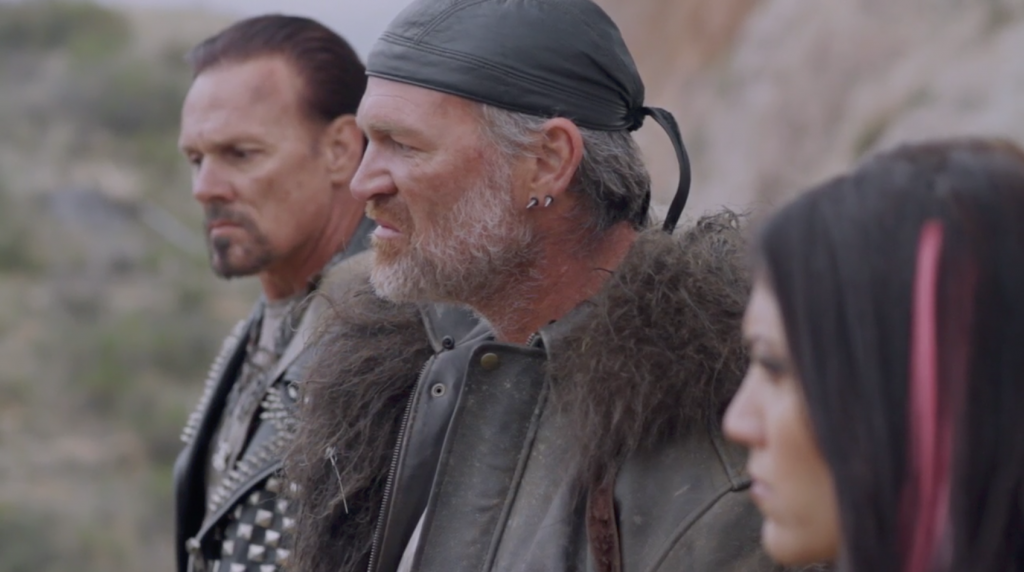At Home at the End of the World, by Tim Acheson
28 May
Watching The Sea of Glass and Fire, the second film in the Revelation Road trilogy, the best way that I know how to describe it is: It’s a raisin cookie. Ever take a bite of a cookie you thought was chocolate chip and think, “Ugh! Raisins!” but then just plow ahead and finish it because, hey, you already started it and raisin cookies aren’t half bad?
Where The Beginning of the End was dull when it wasn’t being offensive, neither quality is present in The Sea of Glass and Fire. It’s a film I don’t imagine I’ll watch a second time, but am nonetheless glad I saw. Highlights include 1) Josh (David A.R. White) shooting a thug while his hands are handcuffed behind his back, 2) A hostage smiling and wrapping cloth around his knuckles, repeating “I’m a good man,” as he prepares to take revenge on his captor – a man he told Josh he would allow the police to “take care of” after Josh sets him free, and 3) Character development for biker gang leader Hawg (Brian Bosworth) and his born-out-of-wedlock daughter, Cat (Andrea Logan White). What these aspects of The Sea of Glass and Fire have in common is: They subverted my expectations.
Josh rolling on the ground, snatching up a pistol, turning, and firing from the hip to take out his assailant? That had my inner child going “Cool!” As someone who grew up with films like The Matrix, I’m a sucker for inventive ways of shooting a gun. Sure, it’s just one action scene. But, like water in the desert the film takes place in, with the Revelation Road series one takes what they can get. And The Sea of Glass and Fire, thankfully, has plenty to give. “I’m a good man. I’m a good man….” Rarely, if ever, have I seen such darkness – however briefly – in a Christian film. Unlike the preaching, it’s an aspect of The Sea of Glass and Fire that doesn’t feel forced. Cutting away before any blows are landed, the ensuing violence is left to the viewer’s imagination and is all the more chilling for it.
And a Christian film villain who isn’t a one-dimensional stereotype? Never thought I’d see such a thing. No longer are Hawg and Cat discount Mad Max road warriors, but a family responding the only way they know how to the hand that life has dealt them.
Revelation Road 2: The Sea of Fire and Glass follows Josh as he attempts to get home to his family immediately following the Rapture. Pursuing Josh is Hawg, out for vengeance after the death of three of his men in The Beginning of the End. The parallels between Revelation Road and Mad Max are more clear this time around. A future dystopia where gas is in short supply, where law and order have broken down and people are driven solely by their base desires, and where a vicious band pursue a former civil servant (in Mad Max, a cop, in Revelation Road, a Black Ops soldier) across a wasteland, it’s clear what secular films the creators of Revelation Road drew from.
Maybe it’s because this is the second film in the series and I’m used to what I’m seeing now, but the parallels to Mad Max didn’t bother me this time. Despite the story’s occasional dip into dark, unexpected, thought-provoking, or emotionally satisfying territory, for me there was a sense of campiness that ran through the whole experience, reminding me of films such as Birdemic: Shock and Terror. Like Shock and Terror, The Sea of Glass and Fire is a film that I ultimately can’t be upset with.
Yes, the acting and dialogue could generally be better. A lot better. Yes, I wish that, as dark as The Sea of Glass and Fire goes, that it would have gone darker in order to more accurately portray the unfortunate realities of this fallen world. And yes, the film does demonize non-Christians at the expense of its plot.* But despite all of that, The Sea of Glass and Fire is one sea I’m glad I swam in.
*An Indian man who is a follower of Hinduism refuses to let the guests at his motel leave until they’ve paid him. The people say they don’t have money. But they checked into the motel before the Rapture happened — before they decided to leave in order to look for their missing loved ones — so they would’ve had to pay for having stayed there anyway. Did all of these people just check into a motel with no intention of paying? I don’t buy it.




No comments yet